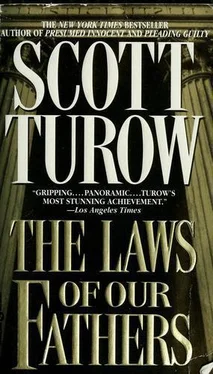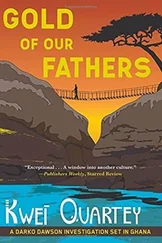Scott Turow - The Laws of our Fathers
Здесь есть возможность читать онлайн «Scott Turow - The Laws of our Fathers» весь текст электронной книги совершенно бесплатно (целиком полную версию без сокращений). В некоторых случаях можно слушать аудио, скачать через торрент в формате fb2 и присутствует краткое содержание. Жанр: Криминальный детектив, на английском языке. Описание произведения, (предисловие) а так же отзывы посетителей доступны на портале библиотеки ЛибКат.
- Название:The Laws of our Fathers
- Автор:
- Жанр:
- Год:неизвестен
- ISBN:нет данных
- Рейтинг книги:5 / 5. Голосов: 1
-
Избранное:Добавить в избранное
- Отзывы:
-
Ваша оценка:
- 100
- 1
- 2
- 3
- 4
- 5
The Laws of our Fathers: краткое содержание, описание и аннотация
Предлагаем к чтению аннотацию, описание, краткое содержание или предисловие (зависит от того, что написал сам автор книги «The Laws of our Fathers»). Если вы не нашли необходимую информацию о книге — напишите в комментариях, мы постараемся отыскать её.
The Laws of our Fathers — читать онлайн бесплатно полную книгу (весь текст) целиком
Ниже представлен текст книги, разбитый по страницам. Система сохранения места последней прочитанной страницы, позволяет с удобством читать онлайн бесплатно книгу «The Laws of our Fathers», без необходимости каждый раз заново искать на чём Вы остановились. Поставьте закладку, и сможете в любой момент перейти на страницу, на которой закончили чтение.
Интервал:
Закладка:
History. Circumstances and events. They still stand between us. I never would have suspected the degree to which I'm haunted by our past together. Twenty-five years, you think. We were only children. And yet it feels like it could be fatal. What's the difference now? I wonder. Why won't we fail the same way we did a quarter-century ago? I suspect these are the furthest questions from your mind, Seth. What's the saying? Within the body of every cynic beats the broken heart of a romantic. You still believe in the transforming power of Will and
Love. It's so endearing. I want to let you win, to triumph at this quest. I know how important it is for you.
But I worry I may let you down the way I did decades ago. Back then, you needed my devotion, probably so you had the strength to stand apart from your parents. And I couldn't provide it. Not, as I think you feared then, because I didn't believe in or admire you. You do not know ten people, Seth, who feel more vindicated or less surprised by the way the world has embraced your talent. No. What troubled me was your celestial devotion to me. To the girl philosophy student who was supposed to light up the skies at Miller Damon. Because I knew she was a fake. Oh, I had certain gifts. I've never sold myself short. I read Plato while I was still in high school. And believed what Socrates said about knowledge as life's highest quest. To the thought of replacing passion with reason, some singing (passionate?) chord in me responded. Instead, over time, I learned that the differing endpoints of various philosophical excursions were due largely to the places they'd begun. The zero points. The irreducible assumptions. It's who you are to start that makes the difference. And in that light, Plato was, if not wrong, at least deserving of correction. All knowledge derives from passion. And what my passions werewas largely a mystery. Certainly not philosophy. I read the texts in a bloodless way, like an inspector on a tour. I was, I suddenly decided, leading someone else's life. Whose? I didn't have a clue then. But my mother knew like Holy Writ those heavyweight German philosophers I studied. To this day, I can hear her shrilling at meetings, 'That is not what Engels meant! Never!' So l fled, mystified about my motives.
All my life I've been afraid I lack common sense. My mother, shrewd as she was, had none. I mean that she seemed to forget that people would be hurt if she called them names, that a small child might need a meal now and then, that she couldn't work in South Carolina and be a mother tome here. It wasn' t just that she seemed at times to feel overpowered by her own needs – the truth is that we all do – but she had no recognition when it was occurring. And even now I'm afraid she left the same traits in me, the way an unhappy spirit is supposed to remain in a woodland tree.*You' re acting just like Zora' is something I can unleash against myself with the primitive anger of a curse, as I prime myself not to act or speak or feel in given ways. It turns out that one of the passageways to my adulthood was this vow, this secret I didn't even tell myself out loud, not to be like her.
Don't misunderstand. I loved – love – my mother. Yet it was years – not until the end of that trial was nearing – since I felt free to embrace the best of her. I believe Zora would be proud of me. And I know she would adore Nikki. Both thoughts mean a lot. But throughout my younger years I wanted a lot more. I wanted her to be my salvation, my ideal. God, I needed that. I would feel fifty times a day how much I could utilize the strength born of knowing I could simply form myself to her example. And it's my task, the stone I've been rolling up the hill forever, to recognize that can't take place, to see – even though I couldn't bear to say it most of my life – that she was, at moments, a selfish lunatic, that there were times when all her passions, her anxieties, all her towering concerns made me beside the point. Here I am in the shadow of fifty and there still are mornings I wake to happy dreams of the total, devoted, desperate way I loved her when I was young. And when it comes to me that's no longer right, possible, real, I'm crushed. My spirit's broken for hours.
She loved me. Passionately. When it suited her. In response, I learned how to hold some distance. (Big surprise!) And resolved, with the same desperation of my love for her, that I would try not to be as unhappy as she was. Because I knew that for certain, too, that nutsy Zora, with her rages, speeches, scraps of quotes, with her warm whispers for me, her smell of lotion, her walleye, her midnight pacing, meetings, and constant grumbling at the way of the world – that she was swirling like some nebula around a livid core of pain.
The project of my life is to cherish what I can of her, and yet to be neither her mindless imitator nor her willing victim. I will always worship her ferocious independence. But I would rather be dungeon-condemned for all eternity than consign myself to her isolation. I want you to understand how hard this is for me. To be the one writing this letter. To be the one speaking first. To be the one asking. It seems almost cruel to have to say Yes, knowing you may say No. But I heard what you said the other night and I know this won't happen any other way. You are entitled to be told that you are needed. More essential. Not only to Nikki, but to me. You are. It has taken my whole life for me to say this, but I deserve someone I can rely on. Through and through. I know you can be that person, Seth. If I let you. I want to try.
This is a love letter.
Sonny Eulogy for Bernhard Weissman by Seth Daniel Weissman April 1, 1996
I always return to the story of Abraham and Isaac when I think about my father. Some of that springs from the legacy which gave our son his name. But there is more to it, of course. No doubt, we all recall the story. Abraham was the founder of the Western faiths, the first Jew, the first person to know the God to whom most peoples in the world now pray. He was a visionary, a prophet, and, surely, an iconoclast capable of cleaving to his beliefs in the face of universal scorn.
But despite this, Abraham's God decided to test him. He asked Abraham to make a sacrifice of his and Sarah's only child, Isaac, their miracle, who had been bom to them when Sarah was already ninety years old and Abraham one hundred. And according to the story, Abraham complied. He did not say what we would hope a father of today might: I am hearing ugly voices, I need help. He did not ask what was wrong with a God who would demand such a thing, or question whether He was worth worshipping. He did not, so far as the Bible tells us, even beg for Isaac's life, as he had done for the people of Sodom. Abraham simply walked his child up Mount Moriah – I imagine he even made the boy carry the wood for the fire. When Isaac asked where the lamb might be for the religious sacrifice they were undertaking, Abraham told him God was bringing the lamb.
In candor, I've regarded this for some years now as a strange story, a grim tale of how a father would sacrifice his son to his own faith, his own visions. What kind of starting point is this for us anyway, for all the Western faiths? Celebrating the twisted dynamic between the first Jewish father and the first Jewish son? Why do we retell this story? Is it to remind us that every parent since has done better?
I initially asked these questions in an anguished state. It was the last time I ever entered a synagogue. The occasion was the New Year. The other congregants were there to express their commitments to what is referred to now and again in the writings as the God, the faith, and the laws of our fathers. I was there to say the Mourner's Prayer, inasmuch as not much time had passed since my own boy named Isaac had died. For us – Lucy and Sarah, and certainly for me – it's probably the case that every funeral we go to for the rest of our fives will be Isaac's. I apologize for having to share this. But in order to speak of my father, I also have to talk about my children – our wonderful, extraordinary daughter, for whose presence I thank God and all else in the universe every day, and the son we lost.
Читать дальшеИнтервал:
Закладка:
Похожие книги на «The Laws of our Fathers»
Представляем Вашему вниманию похожие книги на «The Laws of our Fathers» списком для выбора. Мы отобрали схожую по названию и смыслу литературу в надежде предоставить читателям больше вариантов отыскать новые, интересные, ещё непрочитанные произведения.
Обсуждение, отзывы о книге «The Laws of our Fathers» и просто собственные мнения читателей. Оставьте ваши комментарии, напишите, что Вы думаете о произведении, его смысле или главных героях. Укажите что конкретно понравилось, а что нет, и почему Вы так считаете.












